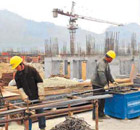Asia-Pacific
China threat to US economy 'doesn't exist'
By Zhang Haizhou and Wang Rui (China Daily)
Updated: 2010-01-29 08:38
 |
Large Medium Small |
China's growth poses no economic threat to the United States, analysts and officials said Thursday, after some commentators suggested that US President Barack Obama was inviting competition with Beijing in his first State of Union speech.
Obama mentioned China twice in his speech to the US Congress.
"China's not waiting to revamp its economy," he said. "Germany's not waiting. India's not waiting. These nations aren't standing still. These nations aren't playing for second place."
He said it's time the US got serious about fixing the problems that are hampering its growth.
"I do not accept second-place for the United States of America," he declared.
The New York Times said such remarks meant Obama "cast Beijing in the role of economic threat to the US".
A commentator for Hong Kong-based Phoenix TV said Obama's speech served as "an invitation to a competition with China."
The US is actually saying, "I will never let you (China) become the World Number One. Such a situation is unacceptable," the commentator said.
In Beijing, a CNN correspondent even asked the Foreign Ministry whether China agrees that it poses an economic threat to the US.
Ma Zhaoxu, the ministry's spokesman, denied the view. "The so-called threat from China doesn't exist at all."
Beijing hopes Washington's foreign policy will promote world peace and development, Ma said, adding a healthy Sino-US cooperation is beneficial to both sides and the whole world.
Sun Zhe, a professor on US studies in Tsinghua University, said China could still not compare with the US in terms of either soft or hard power.
"China's net GDP, for example, is roughly $5 trillion (in 2009), which is only one third that of the US," Sun said, adding Washington's role on the global level is also "decisive".
"The best way for China is to put all our attention on our own development and not care about what others have said," Sun added.
US foreign policy
Obama spent "exactly nine minutes on national security issues", the New York Times said.
Afghanistan, Iraq, Iran, and the Democratic People's Republic of Korea (DPRK) were the only four countries named, China wasn't mentioned.
David Rothkopf, a former Clinton administration official and foreign policy expert, said that he "can't recall a State of the Union address that devoted less time or attention to foreign policy issues than this one."
Rothkopf, quoted by the New York Times, said that Obama has judged that Americans right now are "looking inward."
The four countries mentioned would be the major focus of US diplomacy in the following 12 months, said Fu Mengzi, a senior researcher on American studies with the China Institutes of Contemporary International Relations.
"Obama met unexpected challenges in Afghanistan during the first year of his presidency. He has underestimated the severity of the situation," Fu said, noting the Afghan issue is impossible for the US to give up.
Also in Iran and the DPRK, the progress Obama achieved couldn't match his expectations. "He needs more time," Fu said.
China Thursday reaffirmed its willingness to work with the United States after President Barack Obama delivered his first State of the Union Address.
"We note China is mentioned in the State of the Union address. China would like to work extensively with the United States for mutual benefit," Foreign Ministry spokesman Ma Zhaoxu told reporters at the regular briefing.











